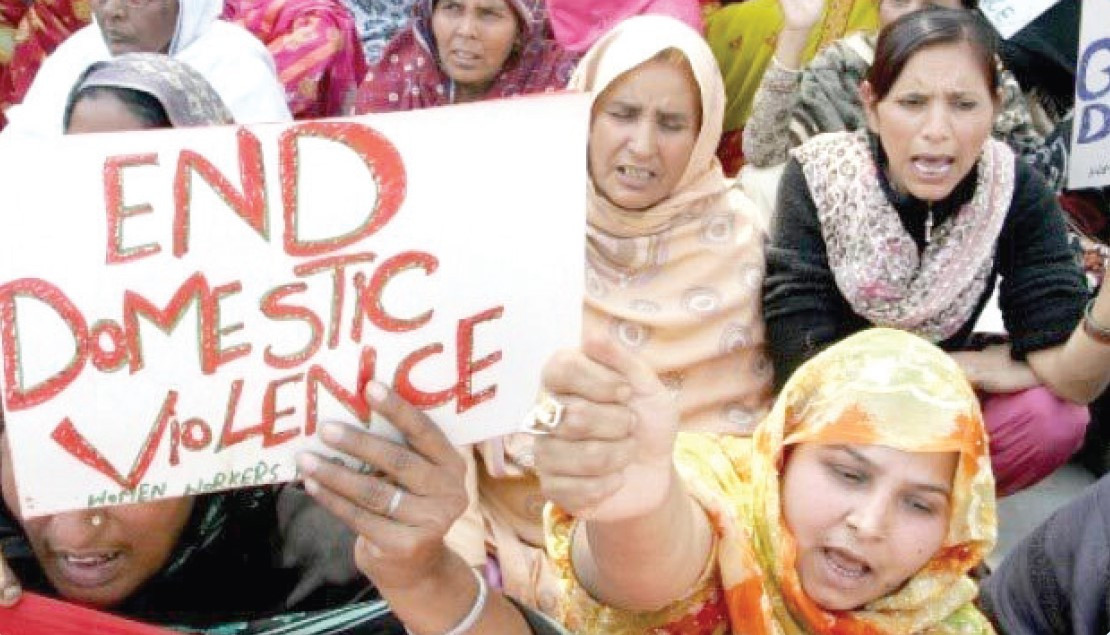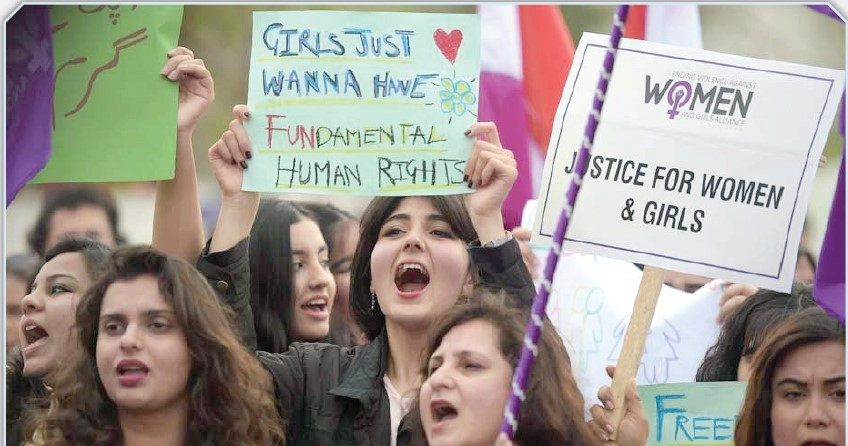Violence against women and girls is one of the gravest and most frequent violations of human rights. Occurring both in public and in private, it is a threat to human security and dignity; a violation of respect, justice and ethics; an abuse of integrity and civil rights; a breach of individual basic rights and a threat to sustainable development.
The United Nations defines violence against women as “any act of gender-based violence that results in, or is likely to result in, physical, sexual or psychological harm or suffering to women, including threats of such acts, coercion or arbitrary deprivation of liberty, whether occurring in public or in private life.” Unless specified differently, the term “women” refers to females of all ages, including girls.
Sixteen days of activism
“16 Days of Activism against Gender-based Violence” is an international campaign that began in 1991 to oppose violence against women and girls. Starting from November 25, which is the International Day of Elimination of Violence against Women, to December 10, the International Human Rights Day, the campaign calls on individuals and groups around the world to act toward ending all forms of violence against women and girls.
This year, the United Nations marks the 16 days under the theme “Invest to Prevent Violence against Women and Girls”. Using #NoExcuse as a slogan and hashtag, the campaign calls for financing different prevention strategies and transforming social norms to end violence against women and girls.
Legal framework
The Constitution of Pakistan guarantees equality between men and women. Article 25 states, “All citizens are equal before the law and entitled to equal protection before the law; nothing in this article shall prevent the State from making any special provision for the protection of women and children”. Article 34 additionally emphasises, “Steps shall be taken to ensure the full participation of women in all spheres of life”. There are also some other provincial and federal laws for protection of women.
According to the Universal Declaration of Human Rights, all human beings are born free and equal in dignity and rights. The United Nations Convention on the Rights of the Child (UNCRC) declares that, “States parties shall respect and ensure the rights to each child without discrimination of any kind, irrespective of child’s sex ….” Pakistan has been party to the UNCRC for 33 years.
Pakistan also became a party to the Convention on the Elimination of All Forms of Discrimination against Women (CEDAW) in 1996, which emphasises that ,“States parties shall take all appropriate measures to ensure the full development and advancement of women, for the purpose of guaranteeing them the exercise and enjoyment of human rights and fundamental freedoms on a basis of equality with men.
The UN’s Sustainable Development Goals (SDGs), specifically Goal 5, “Gender Equality,” includes targets related to ending violence against women. Through its various entities, such as UN Women and Unicef, the UN leads and supports initiatives focused on eliminating violence against women. It provides resources, expertise and coordination to facilitate global efforts in preventing and responding to GBV. It engages in promoting policies and programs that address the root causes of violence against women and work toward achieving gender equality.

On-ground reality
International and local law both require Pakistani women and girls enjoy basic human rights in full. However, gender discrimination and violence against women and girls in Pakistan is a serious concern for both, national and international human rights entities. Pakistan ranks 142 out of 146 countries in terms of gender equality, according to the World Economic Forum’s Global Gender Gap Index 2023.
Despite massive underreporting of violence against women, according to the Human Rights Commission of Pakistan (HRCP), there were 5,279 rapes (including gang rape) and 478 honour killings registered in the country in 2021. According to another 2020 study by HRCP, “90 percent of Pakistani women have experienced some form of domestic violence in their lifetime.”
A 2020 annual report by the women’s rights organisation Aurat Foundation, found that over 11,000 cases of violence against women were reported in 2020. The most common forms of violence were domestic violence (4,775 cases), rape/gang rape (2,297 cases) and murder (1,033 cases). These, and many other disturbing statistics, prove that awareness campaigning against gender based violence is necessary in the narrative for Pakistan.
Violence against girls prevails in several forms like physical, sexual, verbal and mental. It occurs from sex-selective abortion to mental coercion/abuse. It starts from childhood, beginning with less educational opportunities for girls, for instance. Most girls still lack access to free or affordable essential services in sectors such as health, justice and social support to ensure their safety, protection, recovery and recreation. Safe mobility is very challenging for girls overall Pakistan.
Child marriages, exchange and forced marriages are the ugliest form of violence against girls. In the outcome report of Pakistan’s Fourth Universal Periodic Review (UPR), several countries reminded Pakistan to enact and enforce legislation to combat child marriages. Pakistan accepted the recommendations on raising the legal age for marriage to 18 years. However, at the time of writing this article, no such provision has been introduced. Except in Sindh, the marriage age for girls is 16 years across the rest of the country.
Young girls from religious minority communities remain particularly vulnerable to abuse and violence in the name of conversion and marriage. At least 1,000 non-Muslim girls are forcibly converted to Islam and forced to marry older Muslim men in the country annually, according to HRCP’s 2019 report. Data shows that incidence of forced conversion are accompanied by a range of other criminal offenses, including but not limited to, assault, kidnapping, abduction, forced marriage, child marriage, rape, gang-rape, forced prostitution, and use of force.
Corporal punishment in homes and schools is another form of violence against girls which is a serious threat to their growth and development. Sexual harassment/abuse/rape, trafficking, and acid burning are additional risks to young girls and women. Harmful traditions like vani, swara, honour killings, karo kari, dowry related violence, denial of inheritance rights are cultural practices and forms of violence from which Pakistani girls and women suffer. Pakistan has promised in the Fourth UPR to combat all forms of discrimination and violence against women and children by reinforcing the relevant legal framework, running awareness campaigns and ensuring that perpetrators are brought to justice. Furthermore, the victims should receive appropriate help.
Child labour is another serious concern. Article 25-A of the Constitution of Pakistan guarantees the provision of free and compulsory education to all children aged five to 16. In contrast to this constitutional provision, there is no uniform standard for the age of a working child in the various labour codes in Pakistan. In the informal work sector, girls constitute a large portion of domestic workers and they start work at the very young age of eight years. They are often mistreated, as seen in the cases of Rizwana, Tayyba and Shazia. In some circumstances, they have been subjected to abuse resulting in their death.

Curbing violence against women and girls
Pakistan needs to enact legislation, strengthen institutions and allocate resources to combat violence against women. There must be emphasis on the importance of comprehensive services for the survivors of gender-based violence, including access to justice, health care, and support systems.
If we do not address violence against girls, and don’t give them proper opportunities, Pakistan’s sustainable economic and social growth will remain elusive. For example, implementation of Article 25 A of the constitution would empower girls directly. Research has shown that when we educate a girl and invest in her development, she becomes a woman who lifts herself and her family out of poverty. Therefore, the government needs to take urgent measures to deal with the issue of child labour.
Corporal punishment in any setting should be banned. School-based violence prevention programs for both girls and boys can address gender norms and attitudes before they become deeply ingrained in children and youth. The most common feature of violence prevention programs is the provision of opportunities to develop interpersonal skills. In addition to interpersonal and problem-solving skills, effective violence prevention programs target antisocial attitudes and beliefs associated with aggression and violence.
Pakistan has a number of key human rights challenges, but the government should prioritise the rights of women and girls. There must be strong child protection policies in all provinces. The National Commission on the Status of Women and National Commission on the Rights of Child should be strengthened as these have several initiatives to empower girls and women and to curb violence against women and girls. The government should promote opportunities to empower girls. It should endorse zero tolerance against gender-based violence in the society and make it a part of the constitution, laws and policies.
How can you help?
At individual and community level, we should connect with organisations in the community that are dedicated to ending violence against women and girls. Volunteering our time, offering financial support, or participating in their events and fundraisers, we can intensify the impact and create safer spaces for all. We can raise our voice for gender equality and women’s rights by engaging with local and national policymakers to promote laws and policies that protect women from violence.
We can support campaigns that call for stronger measures against sexual harassment and assault. We can lend an ear to survivors of violence to share their stories and experiences with us. We should listen with empathy, validate their experiences, and support them in their healing journey. By amplifying their voices, we break the silence surrounding violence against women and empower others to seek help and justice. Share the stories you collect on social media using relevant hashtags to reach a broader audience and inspire change.
By understanding its significance, spreading awareness, supporting survivors, and advocating for change, we can contribute to the global movement striving for a world where every woman can live free from fear and violence. Together, we can create an environment where women can enjoy their all rights.
Nabila Feroz Bhatti is a human rights activist and columnist. She uses the handle @NabilaFBhatti on X and can be reached at nabilaferoz@gmail.com
All facts and information are the sole responsibility of the writer
